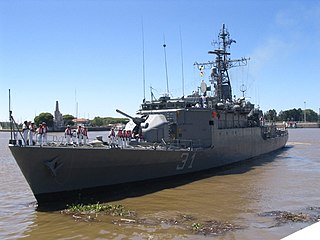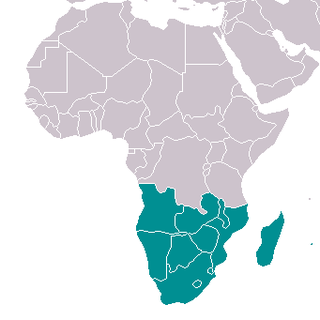
United Nations General Assembly Resolution 1761 was passed on 6 November 1962 in response to the racist policies of apartheid established by the South African Government.

The Anti-Apartheid Movement (AAM) was a British organisation that was at the centre of the international movement opposing the South African apartheid system and supporting South Africa's non-white population who were oppressed by the policies of apartheid. The AAM changed its name to ACTSA: Action for Southern Africa in 1994, when South Africa achieved majority rule through free and fair elections, in which all races could vote.

Disinvestmentfrom South Africa was first advocated in the 1960s in protest against South Africa's system of apartheid, but was not implemented on a significant scale until the mid-1980s. A disinvestment policy the U.S. adopted in 1986 in response to the disinvestment campaign is credited with playing a role in pressuring the South African government to embark on negotiations that ultimately led to the dismantling of the apartheid system.
The Western Contact Group (WCG), representing three of the five permanent members of the UN Security Council - France, United Kingdom and United States - and including Canada and West Germany, launched a joint diplomatic effort in 1977 to bring an internationally acceptable transition to independence for Namibia, after a decade of illegal occupation by apartheid of South Africa.

United Nations Security Council Resolution 418, adopted unanimously on 4 November 1977, imposed a mandatory arms embargo against South Africa. This resolution differed from the earlier Resolution 282, which was only voluntary. The embargo was subsequently tightened and extended by Resolution 591.

United Nations Security Council resolution 591, adopted unanimously on 28 November 1986, after recalling resolutions 418 (1977), 421 (1977), 473 (1980) and 558 (1984), the Council strengthened the mandatory arms embargo against apartheid South Africa imposed by Resolution 418, and made it more comprehensive. Resolution 591 sought to clarify vague terms from previous resolutions on the topic.

South Africa under apartheid was subjected to a variety of international boycotts, including on sporting contacts. There was some debate about whether the aim of the boycott was to oppose segregation in sport or apartheid in general, with the latter view prevailing in later decades. While the National Party introduced apartheid in 1948, it added sport-specific restrictions from the late 1950s, on interracial sport within South Africa and international travel by nonwhite athletes. The international federations (IFs) governing various sports began to sanction South Africa, both in response to the new restrictions and in reflection of the broader anti-racism of national federations in newly independent postcolonial states. By the early 1970s, South African national teams were excluded from most Olympic sports, although South Africans competed in individual events in some, mainly professional, sports through the 1980s. Although from the mid-1970s the National Party relaxed the application of segregation provisions in relation to sport, this failed to alleviate the boycott, which continued until the end of apartheid.

Foreign relations of South Africa during apartheid refers to the foreign relations of South Africa between 1948 and 1994. South Africa introduced apartheid in 1948, as a systematic extension of pre-existing racial discrimination laws. Initially the regime implemented an offensive foreign policy trying to consolidate South African hegemony over Southern Africa. These attempts had clearly failed by the late 1970s. As a result of its racism, occupation of Namibia and foreign interventionism in Angola, the country became increasingly isolated internationally.

In United Nations Security Council Resolution 417, adopted on October 31, 1977, after reaffirming Resolution 392 (1976), the Council condemned the continuing repression against black people and other opponents of apartheid, as well as the South African media and the mounting deaths of detainees. The Council foresaw that the continuation of such activities would lead to serious racial conflict with international repercussions.

United Nations Security Council Resolution 421, adopted unanimously on December 9, 1977, after recalling Resolution 418, the Council decided to establish a committee to oversee the implementation of that resolution. It tasked the committee to report back on its observations and recommendations regarding ways in which the arms embargo could be made more effective against South Africa and to ask Member States as to how they are implementing the resolution.

United Nations Security Council resolution 473, adopted unanimously on 13 June 1980, after recalling resolutions 392 (1976), 417 (1977), 418 (1977), 454 (1979) and 466 (1980) and letters from the Committee for South Africa, the council expressed its concern and condemned South Africa for the killing of protesters, including schoolchildren, opposed to apartheid.

United Nations Security Council resolution 558, adopted unanimously on 13 December 1984, after recalling resolutions 418 (1977) and 421 (1977) which imposed a compulsory arms embargo on South Africa and established a committee to monitor it, the council stressed the continuing need for all Member States and international organisations to observe the arms embargo.

United Nations Security Council resolution 566, adopted on 19 June 1985, after recalling resolutions 269 (1969), 276 (1970), 301 (1971), 385 (1976), 431 (1978), 432 (1978), 435 (1978), 439 (1978), 532 (1983) and 539 (1983), the Council expressed concern at the tension and instability caused the continued occupation of Namibia by South Africa, noting the apartheid policies implemented in the territory and that the territory was used as a springboard for attacks on other southern African countries.

United Nations Security Council resolution 581, adopted on 13 February 1986, after hearing representations from Sudan and the front-line states and reaffirming resolutions 567 (1985), 568 (1985), 571 (1985), 572 (1985) and 580 (1985), the Council strongly condemned "racist South Africa" for its recent threats to perpetrate acts of aggression against neighbouring countries in southern Africa.

In United Nations Security Council resolution 615, adopted unanimously on 17 June 1988, after reaffirming resolutions 503 (1982), 525 (1982), 533 (1983), 547 (1984) and 610 (1988) expressing concern at the imposed death sentences of anti-apartheid activists, the Council noted the deteriorating situation in South Africa.

On 14 January 1994, the United Nations Security Council unanimously adopted resolution 894 which discusses various aspects relating to the upcoming South African General Elections. This occurred after the council recalled resolutions 765 (1992) and 772 (1992) on South Africa.

United Nations Security Council resolution 930, adopted unanimously on 27 June 1994, after recalling resolutions 772 (1992) and 894 (1994), the Council noted with satisfaction that a democratic and non-racial government had been established in South Africa, and terminated the United Nations Observer Mission in South Africa (UNOMSA).

United Nations Security Council Resolution 1714, adopted unanimously on October 6, 2006, after recalling previous resolutions on the situation in Sudan, particularly resolutions 1590 (2005), 1627 (2005), 1653 (2006), 1653 (2006), 1663 (2006), 1679 (2006), 1706 (2006) and 1709 (2006), the Council extended the mandate of the United Nations Mission in Sudan (UNMIS) until April 30, 2007.
The 1973 United Nations International Convention on the Suppression and Punishment of the Crime of Apartheid was the first binding international treaty which declared the crime of apartheid and racial segregation under international law. It was adopted by the General Assembly on 30 November 1973 and came into force on 18 July 1976. It passed by 91 votes in favor, four against and 26 abstentions. 110 countries are currently parties to the convention, with 26 signatories.

As a response to South Africa's apartheid policies, the international community adopted economic sanctions as a form of condemnation and pressure. Jamaica led the movement by being the first country to ban goods from apartheid South Africa in 1959.











